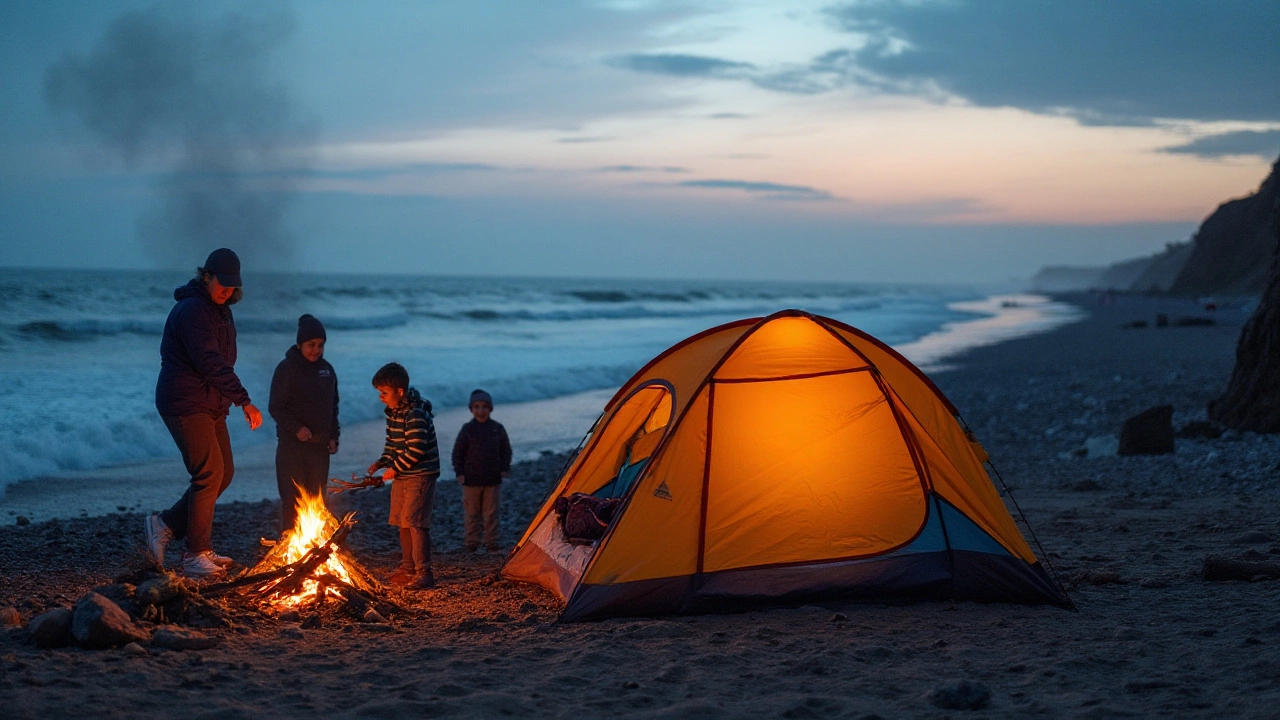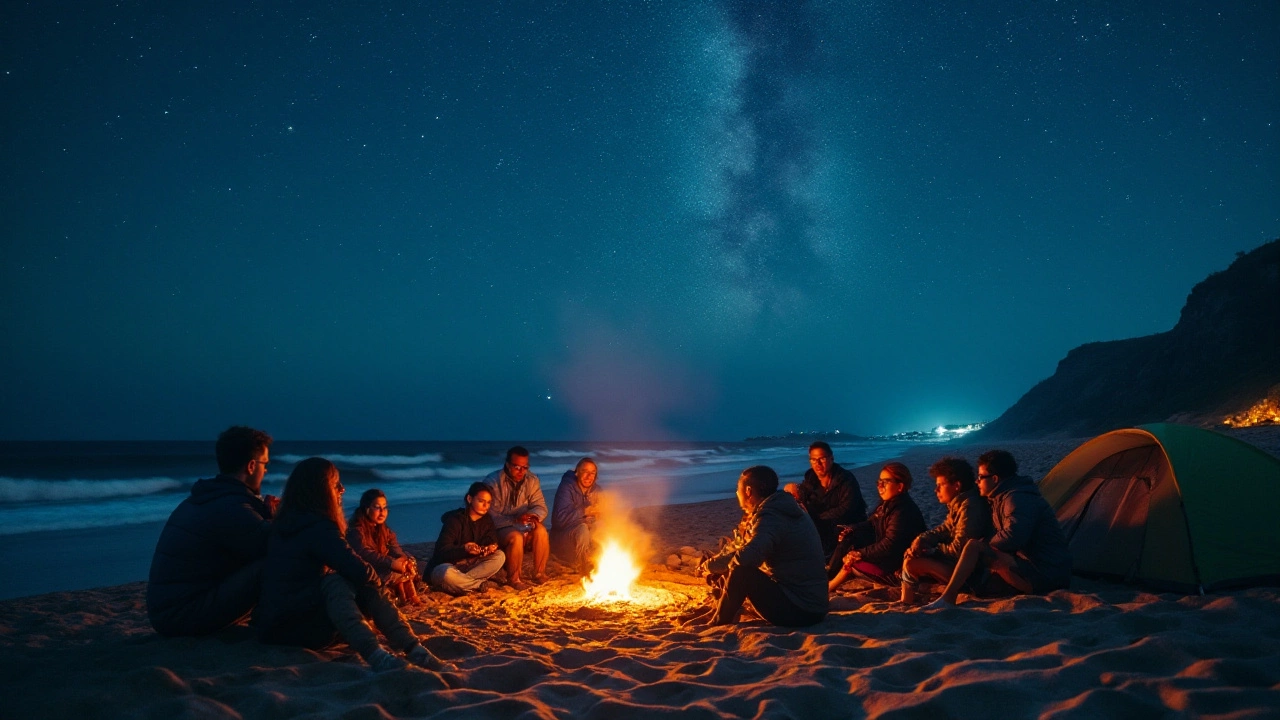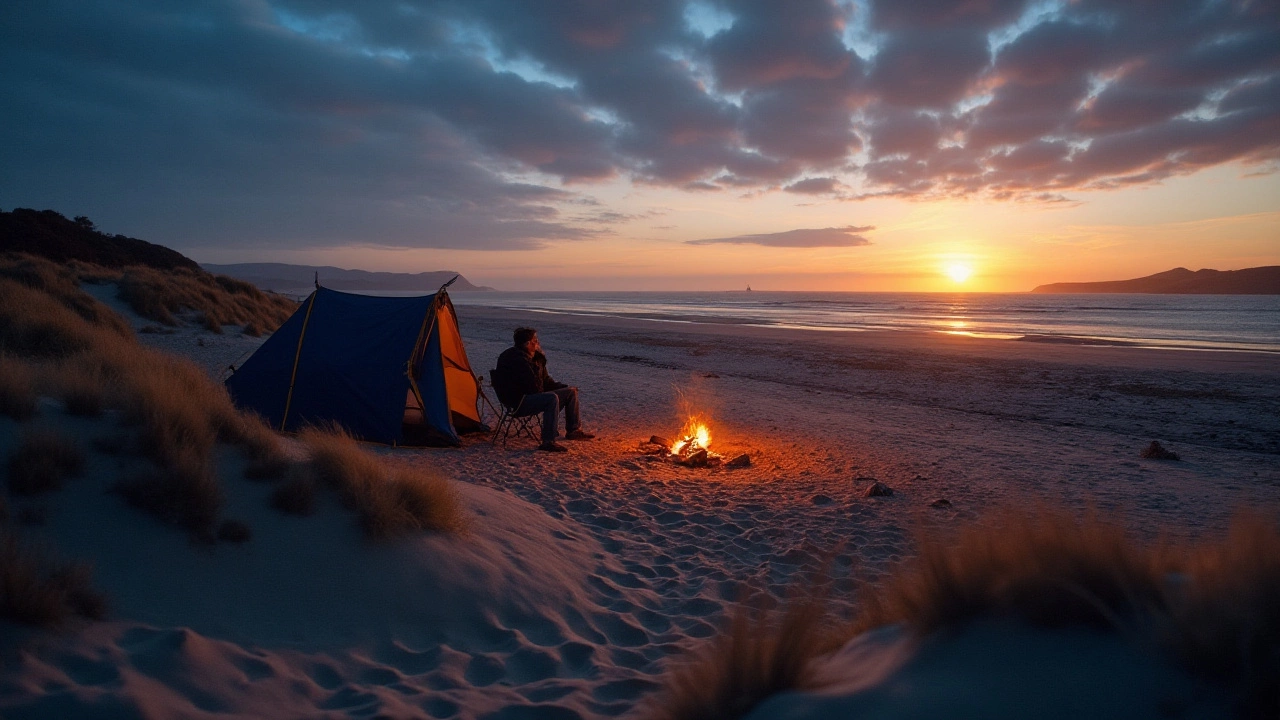Imagine drifting off to sleep to the gentle sound of waves lapping the shore, the salty breeze ruffling the edges of your tent. Such is the beautiful imagery painted by the idea of camping on a beach in the UK. Yet, this fantasy requires a bit of grounding in reality due to legal and environmental nuances.
UK beaches, with their rugged beauty and crashing waves, can be both inviting and unyielding to campers. Knowing where you can legally camp is the first hurdle. Many popular beaches fall under bylaws that restrict camping without permission. Yet, there remain hidden gems where you might still sleep by the sea, provided you're mindful of the laws.
Camping responsibly is paramount. Beaches are delicate ecosystems, and human interference can have lasting impacts. We'll venture into ways to enjoy this memorable experience while leaving no trace.
Equally important is ensuring you pack appropriately. The right gear can mean the difference between a delightful night with nature or a sand-filled tent battle against the elements. Considering the unpredictable UK weather, preparation becomes more than just a matter of comfort—it’s about safety.
- Legal Considerations for Beach Camping
- Best Beaches for Tent Camping in the UK
- Environmental Impact and Respectful Practices
- Essential Gear for Beach Camping
- Safety and Weather Precautions
Legal Considerations for Beach Camping
Camping on beaches in the UK is a romantic notion that appeals to adventurers seeking a more intimate connection with nature. However, before pitching your tent on any scenic beachfront, it's essential to understand the legal landscape. The allure of spending a night under the stars by the seaside must be weighed against the local bylaws that govern coastal areas. The rules are designed to balance public enjoyment with conservation efforts, maintaining the natural beauty of these locations for future generations.
The crux of the matter lies in whether beach camping is permissible without prior consent. In many parts of the UK, especially in England and Wales, the foreshore—defined as the area between the high and low tide marks—is generally owned by the Crown. However, the management of these lands often falls to local authorities or private owners, who might impose restrictions on activities such as camping. It's critical to research and reach out to these authorities to determine the regulations specific to your beach of interest.
Understanding Local Bylaws
Local bylaws are pivotal in dictating where and when you can camp. These laws vary considerably across different regions, reflecting the unique environmental and social considerations of each area. For instance, Pembrokeshire in Wales, with its stunning coastline, often requires campers to obtain permission from landowners or local councils. Similarly, the popular beaches in Cornwall might have restrictions, not just to protect the landscape but also to address issues like waste management and safety. Ignoring these regulations can lead to fines or being asked to leave by authorities.
"Responsible wild camping, even on beaches, contributes to sustainable tourism, engaging adventurers in a manner that respects the environment," notes the UK’s Campaign for National Parks.
In Scotland, the right to *wild camp* is a little more relaxed, thanks to the Land Reform (Scotland) Act 2003, which allows camping on most unenclosed land. However, it's important they're not exempt from responsibility—campers must adhere to the Scottish Outdoor Access Code, which encourages leaving nothing but footprints behind. Despite more lenient rules, certain heavily trafficked areas do have specific restrictions, especially during the peak tourist season, typically from March to October.
Permissions and Planning Ahead
To legally sleep in a tent on the beach, forward-planning is a must. Contacting local councils or landowners, checking online forums, and reading updated local restrictions are fundamental steps to secure permissions. In regions where beach camping is prohibited, nearby campsites offer a viable alternative, often equipped with facilities that make the stay more comfortable while providing easy access to the beach during the day. This can offer a perfect blend of wild camping thrill without the worry of legal issues.
It's crucial to remember that while the UK offers some flexibility for wild camping, adherence to local rules is not just a legal obligation but a step towards sustainable tourism. By respecting the laws and the environment, campers can help preserve these beautiful coastal spaces for everyone to enjoy, making way for memorable journeys that don't compromise the natural wonder of the UK's beachfronts.
Best Beaches for Tent Camping in the UK
The coastline of the United Kingdom is dotted with stunning beaches where adventurers can dream of spending the night under the stars. While camping on every beach might not be permissible, there are some well-trodden and hidden spots where you might enjoy a unique seaside camping experience. For instance, Shell Island in Wales is a well-known camping destination that offers a mix of sand dunes and marine panoramas as far as the eye can see. This privately owned island becomes a camper's haven where you can set up your tent almost right on the beach itself, given that you’re respectful of the rules and environment.
Meanwhile, in Scotland, where the rules on wild camping are slightly more lenient, beaches like Luskentyre on the Isle of Harris offer surreal landscapes with turquoise waters that seem more akin to tropical destinations rather than the cooler climes of the UK. Here, campers can legally pitch tents as long as they follow the Scottish Outdoor Access Code, which emphasizes respecting nature and wildlife. Another intriguing spot is the grandiose Seilebost Beach, with its magnificent views that promise memorable sunrise and sunset experiences.
For those exploring the south of England, West Wittering Beach can be an excellent choice, not directly for camping but because of its proximity to nearby legal camping spots. Though it's not legal to camp directly on the beach here, the surrounding coastal areas have designated sites where you can easily access the beach's beauty and facilities. From here, exploring the sandy stretches in the early morning when crowds are sparse becomes possible, adding a beautiful layer to your adventure.
Intriguingly, some beaches provide a robust historical context which adds another dimension to the camping experience. For example, Rhossili Bay in Wales offers a dramatic blend of history and nature, with the remains of shipwrecks visible at low tide. The National Trust manages this site, and though camping isn't permitted directly on the sand, nearby camping facilities allow for easy access to these scenic vistas. A robust itinerary could include a day spent exploring the beachside and a night around a campfire back at the campsite, sharing stories of the sea.
If one's search for beaches includes a touch of solitude, the lesser-known stretches like Tolsta Beach on the Isle of Lewis offer tranquility, with golden sands and the Atlantic Ocean’s serene rhythm as a backdrop. Despite its remote appeal, Tolsta requires that campers be self-sufficient, respecting local guidelines to leave no trace—a principle that ensures the area remains pristine for future generations to enjoy.
"One should always consider the leave-no-trace philosophy when engaging with nature, paramount to sustain these wonderful seascapes," noted Chris Packham, conservationist and wildlife expert, emphasizing the importance of minimizing impact when visiting sensitive natural environments.
Remember, while these beaches are perfect for a seaside escape, planning is essential. Always check local regulations and weather forecasts before heading out. Tide schedules, too, can influence your experience, as setting up too close to the ocean might invite an unexpected, and altogether unwelcome, sea splash in the middle of the night. Armed with the right knowledge, however, an enchanting night by the British shore awaits.

Environmental Impact and Respectful Practices
Beach camping in the UK not only offers a chance to connect with nature in its rawest form but also demands a tremendous sense of responsibility towards the environment. These picturesque stretches of sand provide crucial habitats for a variety of wildlife, including rare shorebirds and marine life, and thus call for a considerate approach from campers. When camping by the sea, minimizing our environmental impact is not just about respecting laws—it's about ensuring these natural habitats remain unspoiled for future generations.
A principle at the heart of responsible wild camping UK practices is 'Leave No Trace'. This means that whatever you bring to the beach, you must also take away with you. Simple actions, like ensuring all litter is collected and disposed of properly, can make a significant difference. Natural areas, especially coastal regions, can be overwhelmed with waste which can harm wildlife and disrupt ecosystems. Keeping the coastline clean helps maintain the delicate balance of these environments.
Moreover, campers must also be mindful of the local flora and fauna. Many UK beaches are breeding grounds for birds such as terns and plovers. Disturbing these areas can lead to nest abandonment and affect bird populations. Setting up your tent away from dunes and marshy areas is advised, as these spaces often serve as critical habitats. During your stay, try to remain on established paths to reduce erosion and damage to vegetation.
One lesser-known fact is that beach fires and barbecues can cause substantial environmental damage. While they might seem innocuous, they can leave scorch marks, creating lasting scars on the landscape. If a fire is necessary, always use a raised barbecue or a fire pit to ensure the heat doesn't reach the sand surface. Many councils provide designated areas for this purpose, so check local guidelines before lighting up a grill.
Mark Woods, an environmental officer, once noted, "Our beaches are not just recreational spaces; they're living ecosystems. We hope everyone who enjoys these spaces understands their role in protecting them."
Lastly, it is vital to be aware of local conservation efforts and support them where possible. Engaging with local wildlife trusts or beach clean-up groups can both enhance your knowledge and contribute positively to environmental initiatives. Some areas might offer volunteering opportunities, a rewarding way to give back while learning more about the area's natural beauty and challenges.
Understanding these practices doesn't only help maintain beach integrity but also enriches your camping experience, providing a deeper appreciation of these natural wonders. By adopting responsible practices, we ensure that beach camping can remain a cherished activity for generations to come, allowing campers to enjoy the serene landscapes without compromising their pristine charm.
Essential Gear for Beach Camping
Proper preparation lies at the heart of a successful beach camping adventure. The coastal environment, while breathtaking, presents unique challenges that demand specific gear. First and foremost, selecting the right tent on the beach is crucial. A tent designed to withstand windy conditions is non-negotiable due to the brisk breezes common on the UK coastline. Look for tents with sturdy poles and geodesic structures that provide added stability. Anchor your tent securely using sand stakes, which are essential for sandy terrains where conventional pegs fail to hold.
Sleeping arrangements are equally important. A high-quality sleeping bag suited for unpredictable coastal temperatures ensures a restful night. Remember, the beach can get surprisingly cold after the sun sets. Additionally, consider a sleeping pad that offers insulation from the cool sand, providing a much-needed comfort barrier.
Your choice of camping equipment should also include durable, weather-resistant clothing. The coastal climate can shift rapidly from sunshine to rain, making waterproof jackets and layers indispensable. Protect yourself from the sun's rays with a wide-brimmed hat and sunscreen, essential even on cloudy days.
According to the British Mountaineering Council, "Staying warm and dry isn't about one piece of gear but how every element of your equipment works together to maintain your body's core temperature.”
Cooking by the sea is an experience unto itself, but it requires careful planning. Portable stoves or compact grills are ideal, providing a safe means to prepare meals without an open fire, which is often prohibited on beaches. Stock up on sustainable fuel canisters and ensure you have a reliable ignition source. Seal food in airtight containers to prevent sand intrusion and attract less attention from local wildlife.
The beach's isolation heightens the need for a comprehensive first aid kit. Include basic medical supplies and consider adding insect repellent and antihistamines, as coastal areas often harbor more biting insects. Access to clean, potable water is another concern; water filtration systems or purification tablets are invaluable here, addressing both safety and convenience.
Lastly, a headlamp or flashlight is a must for evening and nighttime activities, given the absence of artificial lighting in such remote settings. Choose models with red light options to preserve night vision and minimize impact on the local fauna. Always prepare for the unexpected; pack an emergency whistle and a simple navigation device like a compass or GPS. Though mobile reception might be unreliable, these tools ensure you can traverse the landscape safely.
Embrace the adventure, but do so equipped for anything the coastline might throw at you. With the right gear and a bit of foresight, beach camping in the UK can be a remarkable experience, merging the wild with the wonderful.

Safety and Weather Precautions
Embarking on a beach camping adventure in the UK requires more than just enthusiasm and a sturdy tent. Safety and weather precautions are paramount, especially given the island nation's famously unpredictable climate. The UK weather can change dramatically within mere hours, and thus it is essential to stay informed and prepared. Begin by closely monitoring the local weather forecasts in the days leading up to your trip, and maintain a reliable weather app on your device for real-time updates once you're settled on the beach. Preparation can save a lot of hassle since being caught off guard by a sudden storm can turn an adventure into an ordeal.
Many beach areas are also subject to tidal changes, making it crucial to be aware of tide timings and safe camping spots. High tides can claim unexpecting campers, so understanding the tide schedule is a survival necessity. Choose your camping location above the high tide line, and consult tide tables to predict when it’s safe. Often, the coast guards or local beach authorities can provide insights about safe zones for pitching tents. It's a practice not only for your security but also for minimizing environmental footprint.
Keeping Safe and Prepared
When it comes to wild camping, safety doesn’t stop at checking the weather and tides. It’s mandatory to have a solid first aid kit and knowing basic first aid procedures is immensely beneficial. Camping on the beach can involve unexpected injuries from rocky outcrops or the emergence of wildlife. Wild camping can be a profoundly peaceful experience, but it requires full attention to potential dangers. Camping close to vegetation might seem a good idea as it shelters from wind, yet it could be risky due to wildlife.Do not underestimate the risk of hypothermia, even in relatively mild conditions, as winds can be quite chilling, especially near the coast where the sea breeze is a regular companion. Pack layers, including waterproofs, as beach environments can become damp overnight. It’s also smart to have a knowledgable camping companion who can share the responsibilities and ensures that you aren’t trekking into solitude which could be daunting to those unprepared.
"Camping in nature, especially on a beach, is one of the purest experiences. But it demands attention to nature’s changes and a readiness for any situation," remarks renowned survival expert Bear Grylls.
Lastly, light plays an essential role. Coastal areas can experience very dark nights. Have torches or headlamps at the ready, and spare batteries wouldn't go amiss. Dependence on your smartphone for light and directions is unwise, as coastal areas can suffer from spotty service.
Overall, choosing a safe beach spot, checking weather conditions, preparing adequately for unexpected weather changes, and knowing your limits are all part of a wonderful an unforgettable beach tent camping experience. Enjoy the beauty of the UK’s coasts, while remaining respectful and cautious of the mighty forces of nature which shape them.
